Consulte estos gráficos útiles con información sobre como evacuar de manera segura durante una pandemia.
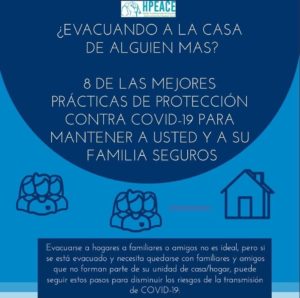
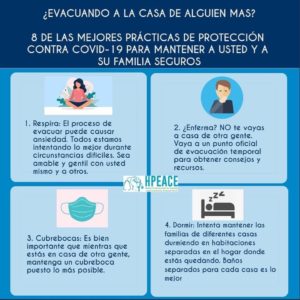
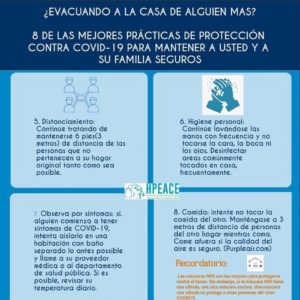
Consulte estos gráficos útiles con información sobre como evacuar de manera segura durante una pandemia.



Please see these helpful graphics with information about evacuating safely during a pandemic. Continue to stay safe out there!
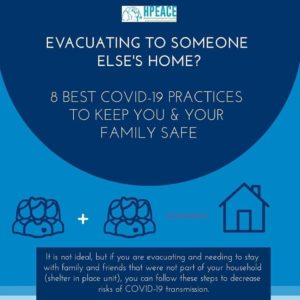
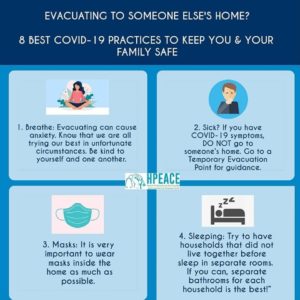
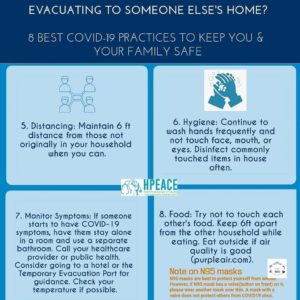
| When We Get Counted, Everyone Benefits! | |
| Children and adults with disabilities and older adults need all Californians to complete the 2020 Census by September 30, 2020. | |
| Act Now – Take the 2020 Census today! There are only 12 more days to be counted. Here are three ways you can complete the 2020 Census: | |
|
|
Online https://my2020census.gov
Phone (844) 330-2020 Mail: Return your paper Census form you received in the mail |
The Census is available in almost every language and there are Census workers who are also available to support all families in completing the form in whichever language is preferred. For more information, visit https://census.ca.gov/
If you have questions about the 2020 Census, please contact Lindsay Franco, Diversity & Equity Specialist at LindsayF@nbrc.net or you can leave a message at 707.256.1102.
The Department of Developmental Services (Department) is responsible for administering the Lanterman Developmental Disabilities Services Act (Lanterman Act). The Lanterman Act provides for the coordination and provision of services and supports to enable people with developmental disabilities to lead more independent, productive, and integrated lives. The Early Start Program provides for the delivery of services to infants and toddlers at risk of having a developmental disability. The Department carries out its responsibilities through contracts with 21 community-based, non-profit corporations known as regional centers, two state-operated developmental centers, one state-operated community facility, and Stabilization, Training, Assistance and Reintegration (STAR) homes.
The number of individuals served by regional centers (consumers) is expected to increase from 348,187 in the current year to 366,353 in 2020-21. The ending population of individuals in state-operated residential facilities is estimated to be 302 on July 1, 2020.
The 2020-21 May Revision includes $9.2 billion total funds ($5.5 billion General Fund [GF]) for the Department in 2020-21; a net increase of $774.6 million ($434.8 million GF) over the updated 2019-20 budget.
SMALL FOCUS GROUP – END OF LIFE PLANNING
NBRC is looking for volunteers to be a part of a small focus group to discuss end of life planning and related issues.
Dr. Mahajan is a part of a larger group of Regional Center clinicians who are working to formulate recommendations that will be submitted to Regional Center Executive Directors and eventually to DDS.
Please e-mail Dr. Mahajan directly, gmahajan@nbrc.net, with names and/or if you are interested in participating in this very important process.
Thank you.
Napa County Community Resource Centers – PG&E will be standing up Community Resource Centers which they staff. PG&E notes that the following services are available at CRC’s: charging stations, snacks (non-perishable), ice, blankets, heat, restroom facilities and water.
– Mount St Helena Golf Course, 2025 Grant St., Calistoga – 8AM to 8PM
– St Helena Catholic School, 1255 Oak Ave., St. Helena – 8AM to 8PM
Charging Stations –
Napa County:
The County has arranged for four charging stations which are primarily for charging devices. Other services are typically not offered, but restroom facilities are available.
– Lake Berryessa Senior Center (4380 Spanish Flat Loop Road, Napa) – 8AM to 5PM
– Napa County Library (580 Coombs St., Napa) 10AM to 9PM
– Yountville Library (6516 Washington St, Yountville) – 8AM to 6PM
– Yountville Community Center (6516 Washington St, Yountville) 8AM to 6PM
Visit the Napa County webpage http://arcg.is/1iOKKD to view PSPS outage zones and for information on local CRCs and Charging Centers locations and hours.
Solano County:
S&S Supply
2700 Maxwell Way
Fairfield, CA 94534
Hours: 8am-8pm
Lowe’s
1751 E Monte Vista Ave
Vacaville, CA 95688
Hours: 8am-8pm
Sonoma County
Cloverdale Citrus Fairgrounds
1 Citrus Fair Drive
Cloverdale, CA 95425
Hours: 8am-8pm
Santa Rosa Veterans Memorial Building
1351 Maple Avenue
Santa Rosa, CA 95404
Hours: 8am-8pm
Olsen Ranch House
37600 Highway 1
Sea Ranch, CA 95412
Hours: 8am-8pm
Hanna Boys Center
17000 Arnold Drive
Sonoma, CA 95476
Hours: 8am-8pm



The NBRC Board Opportunity Fund is a worthwhile benefit that assists clients and families served by NBRC to experience a full range of support, activities and progress in their lives. Any and all donations are greatly appreciated.
The Association of Regional Center Agencies (ARCA) represents the autonomous regional centers objective to support and advance the intent and mandate of the Lanterman Developmental Disabilities Services Act. To learn about important legislative updates and current initiatives.
Disability Rights California is a nonprofit agency. They are the largest disability rights group in the nation. Federal law is established to protect and advocate for the rights of people with disabilities. They are the protection and advocacy agency for California.
610 Airpark Rd.
Napa, CA 94558
Telephone (707) 256-1100
Fax (707) 256-1255
TDD (707) 257-0213
(800) 884-1594 (evenings/weekends)
(0-36 months)
Napa/Solano Counties (800) 646-3268
Sonoma County (707) 755-5113
(707) 751-0171 (Fax)
(3 and over)
(833) 264-4335 / Intake@nbrc.net
We obtain consent by verbally asking if you agree to receive conversational text messages from North Bay Regional Center. Message frequency varies. Message and data rates may apply. For assistance, text HELP, email support@nbrc.net, or call us at 888-256-2555 Ext. 6911. To opt out at any time text STOP. For more information visit the following:
520 Mendocino Avenue
Santa Rosa, CA 95401
Telephone (707) 569-2000
Fax (707) 256-1177
TDD (707) 525-1239
